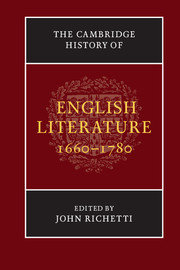Book contents
- Frontmatter
- Introduction
- PART I LITERARY PRODUCTION AND DISSEMINATION: CHANGING AUDIENCES AND EMERGING MEDIA
- PART II LITERARY GENRES: ADAPTATION AND REFORMATION
- PART III LITERATURE AND INTELLECTUAL LIFE: THE PRODUCTION AND TRANSMISSION OF CULTURE
- PART IV LITERATURE AND SOCIAL AND INSTITUTIONAL CHANGE
- PART V LITERARY GENRES: TRANSFORMATION AND NEW FORMS OF EXPRESSIVENESS
- PART VI CONCLUSION
- 30 More is different: literary change in the mid and late eighteenth century
- Chronology
- Bibliographies
- Index
- References
30 - More is different: literary change in the mid and late eighteenth century
from PART VI - CONCLUSION
Published online by Cambridge University Press: 28 March 2008
- Frontmatter
- Introduction
- PART I LITERARY PRODUCTION AND DISSEMINATION: CHANGING AUDIENCES AND EMERGING MEDIA
- PART II LITERARY GENRES: ADAPTATION AND REFORMATION
- PART III LITERATURE AND INTELLECTUAL LIFE: THE PRODUCTION AND TRANSMISSION OF CULTURE
- PART IV LITERATURE AND SOCIAL AND INSTITUTIONAL CHANGE
- PART V LITERARY GENRES: TRANSFORMATION AND NEW FORMS OF EXPRESSIVENESS
- PART VI CONCLUSION
- 30 More is different: literary change in the mid and late eighteenth century
- Chronology
- Bibliographies
- Index
- References
Summary
Because something is happening here
But you don’t know what it is
Do you, Mr Jones?
Bob DylanSomething happened
Between 1700 and 1800 the body of writing we now call ‘Literature’ changed. Whatever the exact placement of the bookends or the particular labels, all of our literary histories of the eighteenth century tell tales of difference. Even proponents of the ‘long’ eighteenth century extend the time frame not because they presume continuity but because they want the discontinuities within their area of expertise. While there is considerable disagreement about the date and nature of those changes, our anthologies enshrine the overall effect: what began as Neoclassical or Augustan ended as Romantic. We know something happened during the eighteenth century but we are not quite sure what it was.
The task is complicated from the start – that is, from our failure to agree on when the ‘eighteenth century’ starts. Although some of our anthologies and literary histories observe the double zeroes, most bundle it into a larger package that starts decades earlier than 1700. Paired with the Restoration, as in this volume, the eighteenth century becomes part of a period (1660–1780) that is fully one-third in the seventeenth century. Blackwell raises that percentage to 40 by pushing the start date back to an even earlier political event; their 1996 anthology runs from the English Civil War (1640) to the French Revolution (1789). ‘Both events’, notes the editor, ‘influenced literature.’
- Type
- Chapter
- Information
- The Cambridge History of English Literature, 1660–1780 , pp. 795 - 823Publisher: Cambridge University PressPrint publication year: 2005
References
- 4
- Cited by



